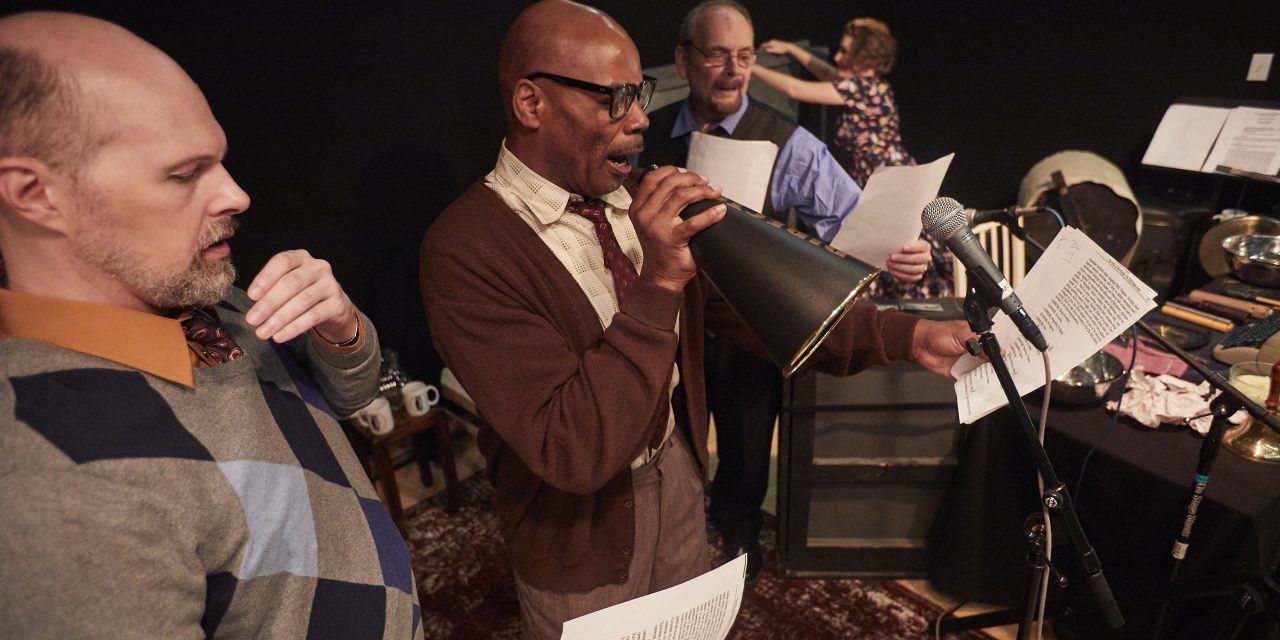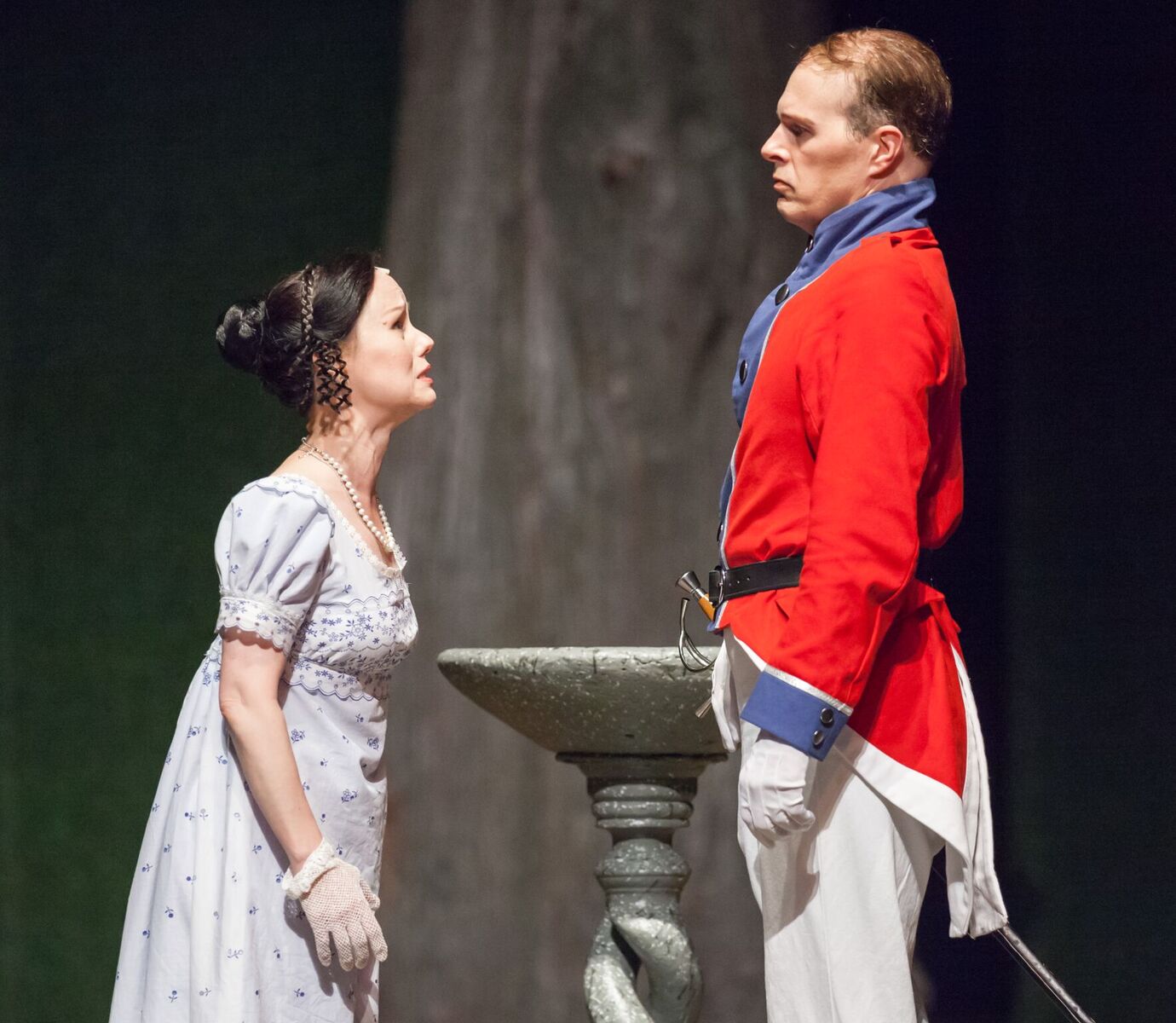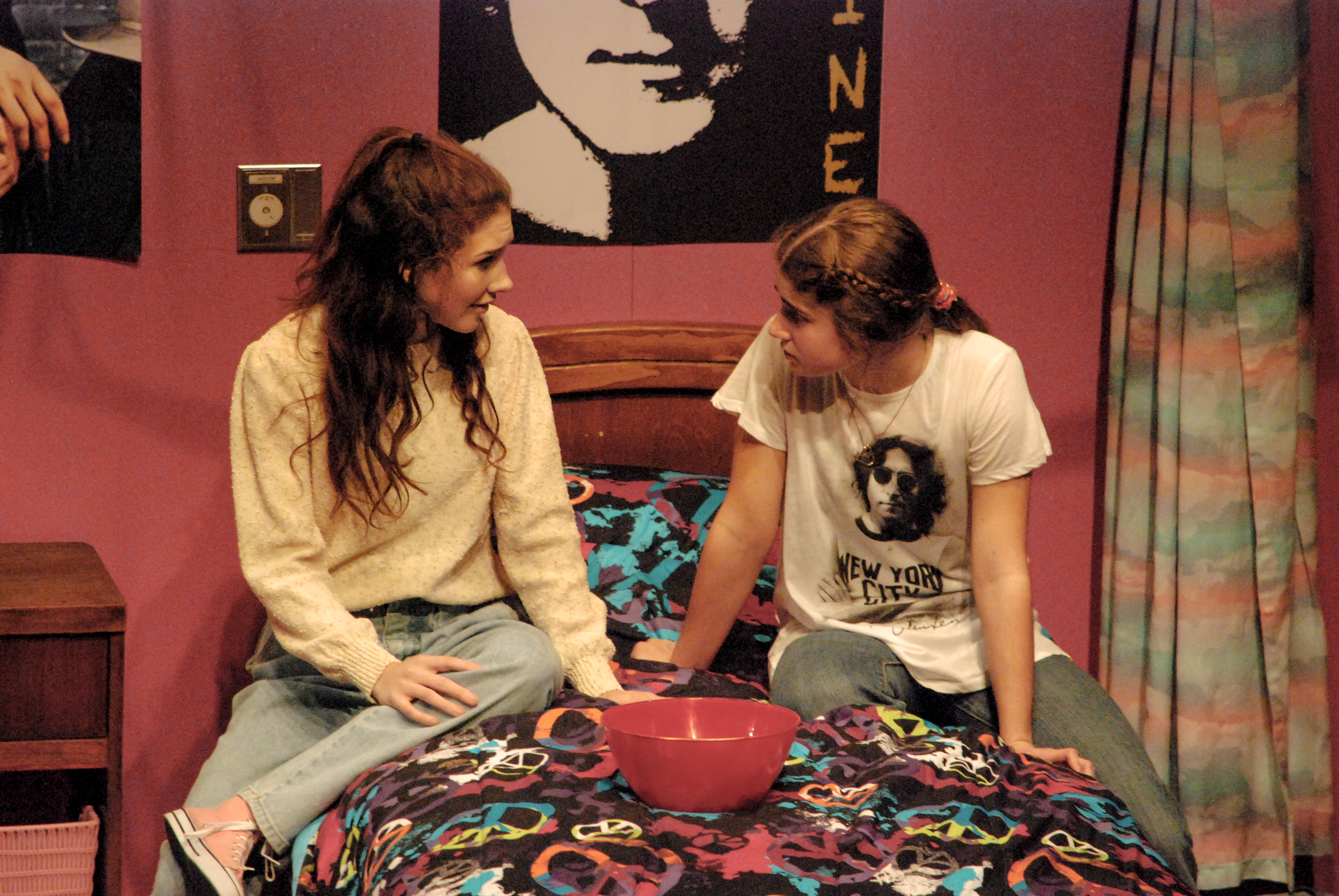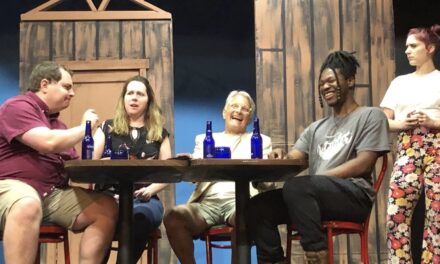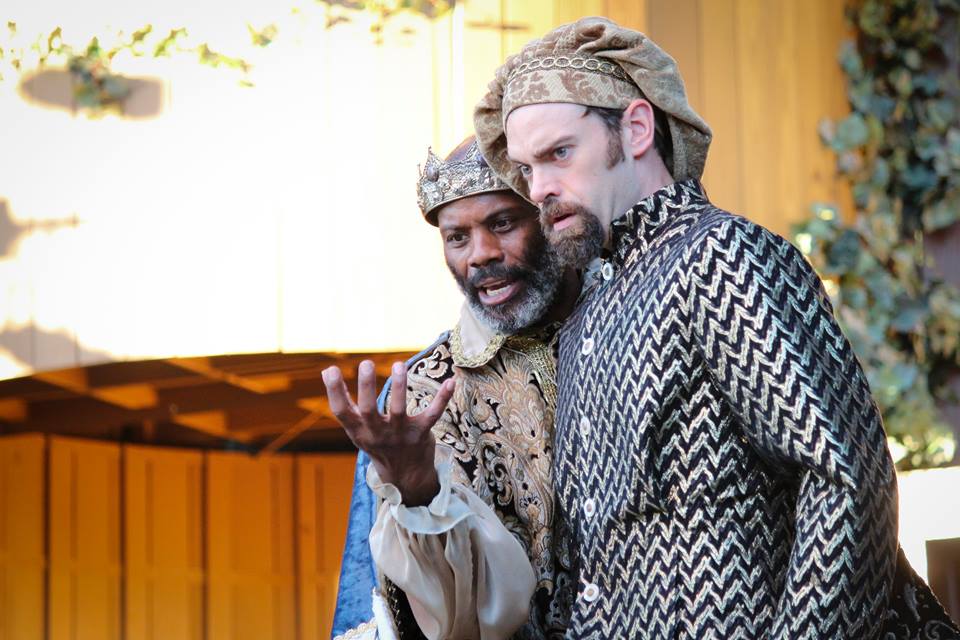Gregory Maupin, Dathan Hooper, Jon Huffman, & Laura Ellis. Photo: KY Shakespeare.
The War of the Worlds
By Howard Koch
Directed by Amy Attaway
Review by Keith Waits
Entire contents copyright © 2018 by Keith Waits. All rights reserved.
(This review is of the October 10 preview performance.)
On October 30, 1938, just before 8:00 pm, Americans gathered around the radio to listen to Mercury Theatre On The Air, an anthology series produced and hosted by Orson Welles. That evening’s program, scripted by Howard Koch, was a modern-day adaptation of H.G. Well’s The War of the Worlds, one of the first tales of alien invasion, in which Martians emerged from meteors to lay waste to all of the Earth’s civilizations. Except that Koch, with help from producers John Houseman, Paul Stewart and Welles himself, structured the program to play, at least in the first moments, as special news bulletins interrupting a normal performance by a dance orchestra. The ruse seems thin even for the time, but Hitler had “annexed” Austria a few months earlier, and was threatening to do more, so the program struck a chord and the resulting panic in the area in close proximity – Welles’ Martians landed in a New Jersey pasture, sent East Coast residents scurrying across bridges and clogging highways.
It was the first real lesson in the frightening potential of mass media. The next day’s “scandal” made Welles a household name nationwide and got the attention of Hollywood studios, which lured him into making movies with the most generous contract ever offered a first-time director. Although the original novel remains a classic, it is arguable that most people know it as a modern story, a trend that begins here.
Amy Attaway’s production of the Koch script is loyal to the period, a new “broadcast” that prefers its own voice to a slavish, note-for-note recreation. That it is staged inside an actual studio within Louisville Public Media is an inspired, albeit obvious, notion. The opening is soft, with a pre-show performance of songs by Gayle King and Laura Ellis as other members begin to ease their way into the space.
Once things get properly underway, Narrator Abigail Bailey Maupin frames the context of a 1938 CBS radio broadcast, while Gregory Maupin plays Orson Welles. There is virtually no impression in Maupin’s performance, and the role of Professor Pierson of the Princeton Observatory is played not by Maupin/Welles, as in the original, but by Jon Huffman. Huffman lends the character an English accent that further distances us from Welles and reaffirms the fresh tone here. Louisville news broadcast veteran and current WFPL on-air personality Jean West handles the breaking news reports of meteors crashing to the earth, another note of verisimilitude, while Ms. Ellis juggles two roles while expertly carrying out her duties as Foley Artist.
The first half of the script relies heavily on the novelty of the fake broadcast, and it is convincing enough to understand the panic…maybe. As the narrative unfolds, the sense of events playing out in real time only holds up for a brief time, until actions that would require hours to occur are announced within moments. By the time that a first person POV from Professor Pierson takes over, and Huffman plays out the script’s longest scene with Dathan Hooper’s unhinged Stranger, there could be no doubt of the nature of the piece, but by then most of New Jersey had no doubt taken to the roads to flee the invasion.
Ms. Attaway also stages the smaller panic that took place in the studio, as reports of public response filtered in and nervous CBS executives forced the late insertion of a station/program ID and a last note of whimsy penned on the fly by Welles. It’s a nice idea, but it is the one aspect of an otherwise beautifully conceived production that doesn’t quite gel. If you also are acquainted with the drama that played outside of the studio during that 60 minutes in 1938, as I am, these actions are clear, but to me, the subplot fell short of its potential. The historical reality is that the halls outside the studio filled with New York City police while the broadcast was still on the air, and perhaps if this part of the staging had pushed a little more to realize that level of alarm, it would have had greater clarity and had a more meaningful impact.
It also could be argued that amping up that portion may have distracted from the main narrative. Perhaps it would have been better left alone because this is still a ripping good yarn. The novel is set in Victorian England, and if adaptations of The War of the Worlds are seen to have had a significant cultural impact, it is almost certainly because they happen at times of great stress and fear of invasion or attack; when America has felt highly vulnerable. Besides Welles’ adaptation during the lead up to World War II, George Pal’s highly influential film version arrived during the Cold War (1953) and Steven Spielberg updated the story only a few years after the 9/11 terrorist attacks (2005), both to great success.
Attaway has muted fun with the play-within-a-play concept of watching actors portray actors acting into microphones, and this lively ensemble renders the material with perhaps more color and anguish than the original. Several roles played by men in 1938 are executed by women here – Ms. Ellis’ annoyed expression as a farm wife after being interviewed was a sly delight, was she in character as Mrs. Wilmuth (MR. Wilmuth originally), or the Foley artist, or both? And some of Mr. Maupin’s nicest moments were in seemingly meaningless asides (is there really such a thing?).
The program has excerpts from the October 31, 1938 edition of The Courier Journal, which is a nicer touch than if the choice had been the New York Times, and along that same note, t-shirts were being sold featuring the iconic Martian tripods stalking the Louisville skyline.
Finally, The War of the Worlds is a welcome entry in the concept of site-specific theatre. Interesting that Kentucky Shakespeare, a company normally devoted to Shakespeare or Bard-related material would be one of the few companies in town to frequently pursue this idea, having twice mounted Titus Andronicus in warehouses before bringing radio drama to an actual radio studio. This production is a treat, but the small capacity of the LPM space will guarantee that many will miss out. If you want to see this, and you should, get your tickets now or regret it later.
The War of The Worlds
October 10 – 28
Fridays and Saturdays at 7:00pm & 9:00pm, Sundays @ 2:00pm
Kentucky Shakespeare
Louisville Public Media
619 South Fourth Street
Louisville, Kentucky 40202
Keith Waits is a native of Louisville who works at Louisville Visual Art during the days, where he is Managing Editor of their Artebella blog, and host of LVA’s Artebella On The Radio on WXOX-FM 97.1/ ARTxFM.com. But spends most of his evenings indulging his taste for theatre, music and visual arts. His work has appeared in Pure Uncut Candy, TheatreLouisville, and Louisville Mojo. He is now Managing Editor for Arts-Louisville.com.

